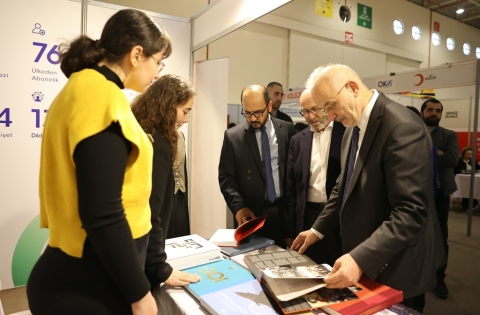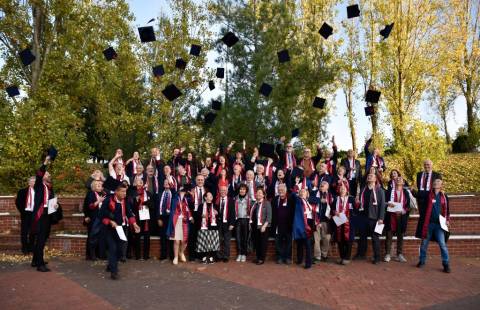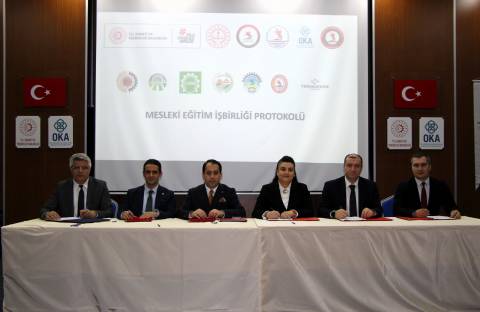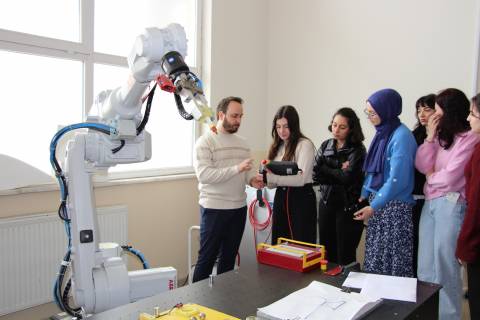Rector Prof. Dr. Aydın Spoke on NTV: OMU's Collaboration with Industry Enhances Regional Value
Türkiye’s first news channel, NTV, in collaboration with Anadolu Sigorta, organized the “Anatolian Meetings,” which brought together Ondokuz Mayıs University (OMU) students, academics, and the Samsun business community. The program, where Prof. Dr. Fatma Aydın introduced OMU, discussed university-industry collaboration and provided information on banking and insurance programs.
In the program moderated by Noyan Doğan, a columnist for Hürriyet Newspaper and a prominent figure in the economy sector, OMU Rector Prof. Dr. Fatma Aydın, Samsun Industrialists and Businesspeople Association President Süleyman Ferşat Eldemir, Anadolu Sigorta General Manager Z. Mehmet Tuğtan, and İş Bank Corporate and Business Banking Sales Division Manager Gaffar Öney participated as speakers.
The program, filmed at the OMU Distance Education Center (UZEM) Conference Hall, took place with the participation of students, academics, and Samsun’s business community.
“OMU has become one of our country's most robust educational institutions with its research university vision and internationalization mission”
Beginning her speech by thanking the NTV team for providing an opportunity to present Samsun and OMÜ to a broad audience, OMU Rector Aydın stated:
“Ondokuz Mayıs University was founded in 1975 and has become one of Türkiye’s most robust educational and research institutions with its goal of becoming a research university and its internationalization mission. Our university houses 20 faculties, 2 vocational schools, 14 vocational colleges, 3 institutes, and 28 research centers. We have a strong team comprising over 6,000 administrative and academic staff. Additionally, we continue to educate approximately 53,000 students. OMU holds an accreditation certificate from the Higher Education Quality Council and a TS EN ISO 9001:2015 Quality Management System certificate as a Candidate Research University.”
“We meet the region’s healthcare needs with application and research centers”
Rector Aydın emphasized the university’s significant role in meeting the healthcare needs of the region through its healthcare application and research centers:
“Our Faculty of Medicine Hospital serves over one million patients annually, and our Faculty of Dentistry Hospital serves 300,000 patients annually. The Faculty of Medicine Hospital has taken a crucial step in health tourism by obtaining the Health Tourism Authorization Certificate approved by the Ministry of Health. Our Organ Transplantation Center is the only facility in the Black Sea region capable of performing live donor kidney and liver transplants. To date, approximately 634 organ transplants, half from cadavers, have been carried out in our hospital. The Animal Hospital, established by our Faculty of Veterinary Medicine in 2010, serves over 30,000 patients annually, operating 24/7. In addition to domestic animals, our Animal Hospital provides healthcare services for farm animals, horses, wild animals, and stray animals in collaboration with the Samsun Metropolitan Municipality.”
“We maintain close collaboration with Samsun’s industrial organizations”
Highlighting Samsun’s dynamic structure as a city deeply rooted in agriculture, production, trade, and industry, Prof. Dr. Aydın said:
“As a university, we make great efforts to adapt to this dynamic structure. We maintain close collaboration with industrial organizations in Samsun. Ondokuz Mayıs University Technology Transfer Office (OMU-TTO) acts as a bridge between our university and the industry.”
Prof. Dr. Aydın stated that OMU-TTO has supported over 200 projects and provided consultancy services to more than 200 companies within five years. “At our university, nearly 100 national and 20 international patent applications have been submitted. Additionally, 45 national and one international patent have been registered. Our Samsun Teknopark Inc., a university-industry meeting point and a partner of our university, operates in two separate campuses, the central location and Ballıca, hosting 123 companies. To date, 350 projects have been completed at Teknopark, and 150 projects are ongoing. The Black Sea Advanced Technology Research and Application Center (KİTAM) has accredited laboratories capable of meeting the needs of both our university and Samsun’s industry,” she added.
“We have undertaken significant research for advancing agriculture”
Rector Aydın elaborated on the Faculty of Agriculture’s efforts:
“Our Faculty of Agriculture conducts significant research to advance environmentally friendly and sustainable agriculture. These studies include combating plant diseases and pests, developing plant varieties that adapt to climate change, efficient water usage, integrating technological developments into agriculture, and producing healthy and reliable food. The first hemp research institute in our country was established at our university. Twelve ongoing projects serve as a robust example of university-industry collaboration. Our institute boasts a rich gene pool for industrial and medical purposes. Studies continue to produce various industrial and construction materials, oils, and food products from hemp, as well as develop medical hemp varieties and use hemp in pharmaceutical and cosmetic industries. The Hemp Products Testing Center and laboratories provide services to R&D and the industry.”
“We offer our students a comprehensive education”
Discussing the academic offerings in banking-related fields, Rector Aydın noted:
“We have a total of 13 programs in banking-related fields and approximately 4,250 students enrolled. Our programs, such as the Bachelor’s in Insurance and Actuarial Sciences at the Bafra Faculty of Business Administration and the Associate Degree in Banking and Insurance at the Çarşamba Commodity Exchange Vocational School, are among our most prominent. The Department of Insurance and Actuarial Sciences is unique in Turkey as it integrates both disciplines into a single program. Furthermore, we observe that students select this department as one of their top three preferences. Alongside this, we have 11 programs related to economy and finance.
We provide our students with a comprehensive education, emphasizing not only theoretical knowledge but also practical training that prepares them for the sector. In this context, we implement workplace training models referred to as ‘7+1’ for undergraduate programs and ‘3+1’ for associate degree programs. Our students complete one term of practical training within the industry through these models. These workplace training opportunities are either offered as elective courses at the university or provided as internships under cooperation protocols with relevant companies. This enables our students to gain sectoral experience, establish connections, and secure employment opportunities before graduation.”
Following the program, internship applications were received. A forum was held after the recording addressed questions from students and businesspeople.


















